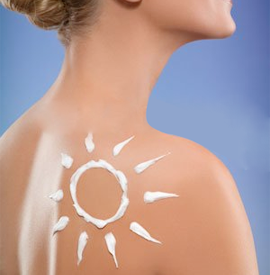The sun is a blessing, but it can also be a curse inflicting sunburns, tanning and premature ageing. Sunlight consists of 3 types of harmful rays viz., Ultra violet A(UVA),Ultra Violet B(UVB) and Ultraviolet C rays. UVC rays will not reach the earth’s surface as the ozone layer will protect the earth. But UVA & UVB rays will reach the earth and produce several harmful effects on our skin by damaging the DNA.M
UVA rays(400-315nm) penetrate deeper in to the skin and can cause:
UVB rays(315-280nm) are the burning rays which produce sunburn on prolonged exposure during summer and it can also produce skin cancer. It produces more DNA damage than UVA rays.
What is SPF value?
 Sun protection factor (SPF) value of a sunscreen is defined as the ratio of energy required to produce skin reddening or burning through the sunscreen, compared to the energy required to produce the same reaction in the absence of the sunscreen. But this is applicable only for UVB rays. Protection from UVA rays is determined by other methods like Critical Wavelength, the persistent pigment darkening (PPD) test and the Boots Star Rating.
Sun protection factor (SPF) value of a sunscreen is defined as the ratio of energy required to produce skin reddening or burning through the sunscreen, compared to the energy required to produce the same reaction in the absence of the sunscreen. But this is applicable only for UVB rays. Protection from UVA rays is determined by other methods like Critical Wavelength, the persistent pigment darkening (PPD) test and the Boots Star Rating.
Sunscreen with SPF 15 may absorb more than 92.6 of UVB radiation while SPF 30 sunscreen may absorb only 96.7% of UVB rays and SPF 40 sunscreen may absorb more than 97.5% of UVB rays.So doubling the SPF sunscreen doesn’t give double protection. So don’t be fooled by the higher SPF products.
What’s important is :
So don’t assume that since you applied sunscreen, you can be in the sun whenever you want. Avoid sun exposure as far as possible and use additional protective measures like umbrella, hats, sun glasses, thick clothing etc.


